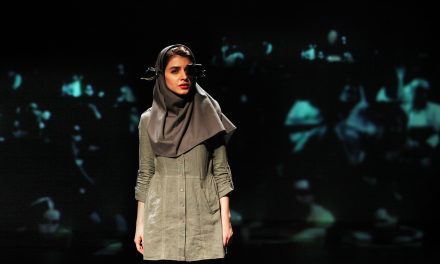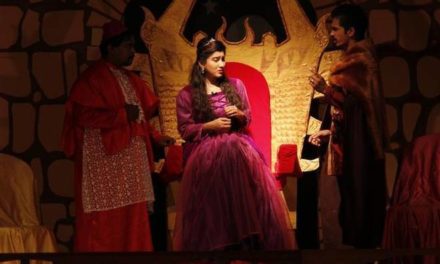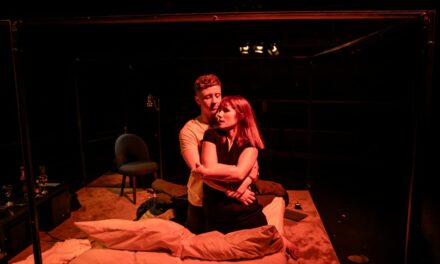Director of the Edinburgh International Festival (EIF), Nicola Benedetti, chose ‘Rituals that unite us” as the theme for this year’s festival, which got off to a stunning start in the shape of a huge spectacle in the grounds of the magnificent George Heriot academy. This late evening show aimed to transport hundreds of Festival-goers from around the world to a transcendent realm of imagination, creativity and wonder. Pinwheel, a company specialised in curating large events, made use of pyrotechnics, Straub lighting and music to morph this 17th century building, its extensive grounds and its views over the Castle and historic Edinburgh. The weather was excellent, which isn’t always a given in Scotland, allowing audiences to roam freely, mesmerised by the various actions and installations, revealing the many intriguing layers of Scotland’s capital city. A new ritual, heralding in three weeks of top-class entertainment from around the world, came into being. Opening the EIF theatre programme this year, Penthesilea, a daring reimagining of German playwright Heinrich von Kleist’s Romantic tragedy, presented by International Theatre Amsterdam (ITA), a long-time Edinburgh favourite. Kleist focuses on the fraught meeting between two important figures in the Trojan war, Penthesilea, mythological Queen of the Amazons, and Achilles, commander of the Greek army. Traditionally, in Penthesilea’s all-female society of warriors, women could only produce children with the men they had defeated on the battlefield. The moment the Warrior Queen sets eyes on Achilles, she falls head over heels in love, unknowing that the relationship will eventually leads to her ruin and that of her people. This pair of star-crossed lovers struggle to reconcile the duty of their public roles as leaders of warring states, and their passion for each other. Goethe deemed von Kleist’s tragedy, ‘unplayable’, an opinion which no doubt was shared by many since the play, written in 1808, was only staged in 1876, sixty-five years after its author’s death. Following a slate of reworkings of the tragedy as opera, poetry, and theatre, adapter and director Eline Arbo, together with composer Thijs Van Vuure, prove that this ancient story is indeed the stuff of drama. In Arbo’s radical reimagining, Penthesilea and Achilles become contemporary rockstars, accompanied by a rock band, whose members alternate between playing music, narrating the tragic story and performing roles. As Van Vuure suggested in a podcast the Amazon Queen experiences, ‘aggressive longing’, a sentiment which pervades the composer’s music. Initially, we see her in command of what is an all-female society and in a passionate relationship with her lover, Prothoe, but yearning and waiting for something else. The moment she sets eyes on Achilles, the mood changes. Once she is assured that, as she puts it, ‘the son of the gods is mine’, she lets herself be seduced by his charisma and his outstanding singing talent (Jess Mensah, in the role of Achilles, is an actor, dancer and singer), evident in his bewitching rendition of the sirens’ song. The hallmark of Arbo’s staging aesthetic is undoubtedly a series of carefully honed stage pictures, combined with music, lighting, and sound effects, which capture the imagination, such as the bed of roses, positioned downstage centre, where the couple make love, discovering their feelings and emotions for the first time. In stark contrast, the final scene, likewise, downstage centre, when the Amazon Queen kills her lover, besmirching his entire body in blood, and, as a final gesture, throwing a handful of roses over his corpse. Roses, usually a symbol of love, her gesture suggests, have no place among the living. In the concluding moments, the haunting song, “Love is Blind”, reminds us that even today, when passionate love takes hold, we are unable to see reality for what it is. ITA’s beautiful rendition of this tragic story stays in the mind long after the performance is over.
This post was written by the author in their personal capacity.The opinions expressed in this article are the author’s own and do not reflect the view of The Theatre Times, their staff or collaborators.
This post was written by Margaret Rose.
The views expressed here belong to the author and do not necessarily reflect our views and opinions.



















